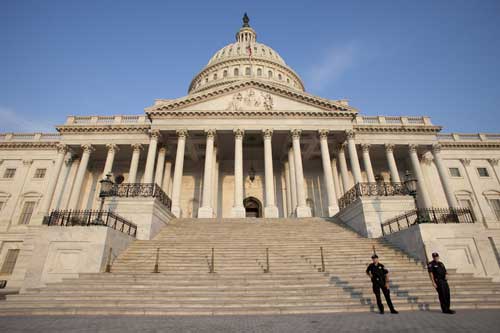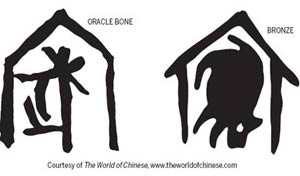US politicians prepare to vote on currency bill
Updated: 2011-10-12 07:52
By Li Xiang (China Daily)
|
|||||||||
|
Capitol Police guard the US Capitol building in Washington DC. Recently, China has been faced with renewed US pressure to appreciate its currency and President Barack Obama has accused China of "gaming the trading system to its own advantage". Andrew Harrer / Bloomberg |
Experts caution legislation likely to provoke trade war if passed
BEIJING - China should keep its currency stable amid growing pressure from the United States, and a fast-appreciating yuan will not help to narrow the trade gap between the two countries, neither will it create more jobs in the US, analysts said on Tuesday.
The US Senate was set to vote on a currency bill on Tuesday (US Eastern Time) to punish China for keeping its currency low. If ratified, the bill would require the US Treasury to determine if China is manipulating the yuan and, if that's seen to be the case, to order the Commerce Department to levy taxes on some Chinese goods.
Recently, China has been faced with renewed US pressure to appreciate its currency and President Barack Obama has accused China of "gaming the trading system to its own advantage".
The allegedly undervalued yuan is being blamed for costing jobs in the US and widening the trade gap between the two countries. That's despite the fact that the yuan has appreciated 5.2 percent against the US dollar over the past year.
Zhao Xijun, deputy director of the Financial and Securities Institute at Renmin University of China, said that sharp currency fluctuations should be avoided, noting that a fast-appreciating yuan would not resolve the current trade problems between China and the United States.
"The US huge trade deficit is mainly due to the structural problems of its own economy and Washington's tight control over some exports," Zhao said.
The accusations have been aired at a time when US citizens are becoming increasingly frustrated with the weak domestic economy and the high unemployment rate ahead of the presidential elections in November next year.
Experts have pointed out that the US is not producing enough college-educated workers to fuel its normal economic growth. The American Society of Civil Engineers also estimated that the country is in need of $2.2 trillion in investments to upgrade its aging and outdated infrastructure.
On Monday, the yuan advanced 0.6 percent to 6.3486 for each dollar in Shanghai, the largest daily increase since China loosened its "dollar peg" in July 2005. Some analysts have also predicted that the yuan may rise further because China is likely to seek to avoid a trade war with the US.
China's Deputy Foreign Minister Cui Tiankai on Monday reiterated Beijing's opposition to the bill, saying that if the proposed legislation becomes law, the result will be a "lose-lose" situation.
In order for it to become law, the currency bill will have to gain the approval of the US House of Representatives and the White House.
Experts said that the bill is highly unlikely to be approved by the Republican-controlled House and the Obama administration is also unwilling to put the bilateral relations at risk.
Last week, the US House Speaker John Boehner condemned the bill as "dangerous" given its potential to provoke a trade war with China.
"If it becomes a law, it will definitely sink the bilateral relationship between the two countries. And it will not only hamper the US economic recovery, but also make a trade war inevitable," said He Maochun, director of the Economy and Diplomacy Research Center at Tsinghua University in Beijing.










